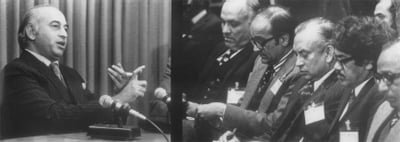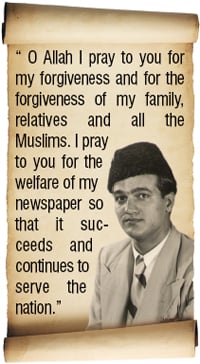A FORCE TO RECKON
WITH
By
Uzma Batool
As
Allama Iqbal said: “The highest art is that which awakens
our dormant will-force, and nerves us to face the trials of life
manfully. All that brings drowsiness and makes us shut our eyes
to reality around us, is a message of decay and death.”
 Following
in the footsteps of Iqbal, Mir Khalil-ur-Rahman with his absolute
will force, single handedly raised an empire known to us today as
Jang Group of Newspapers. It was due to this achievement that he
received the title “Father of Urdu Journalism”, from
his many admirers. Following
in the footsteps of Iqbal, Mir Khalil-ur-Rahman with his absolute
will force, single handedly raised an empire known to us today as
Jang Group of Newspapers. It was due to this achievement that he
received the title “Father of Urdu Journalism”, from
his many admirers.
Mir
Khalil-ur-Rahman was a self made man who nurtured his newspaper,
Jang, from extremely modest beginnings, but later made leaps and
bounds and reached the pinnacle of journalism. It is impossible
to talk about Urdu journalism without shedding some light on the
life of the undisputed king of modern journalism, Mir Khalil-ur-Rahman.
Mir
Khalil-ur-Rahman s legacy in Pakistan is the well established
Jang Group of newspapers which is published from all major cities
of Pakistan. Mir Khalil-ur-Rahman s journalistic career spanned
over an unprecedented 52 years. He was not only the owner and editor-in-chief
of the well-established Jang Group of Newspapers, but also became
a committed reporter in his fervent pursuit of journalism, as and
when it was required. One can witness his complete devotion towards
his profession with the fact that because of financial constraints
in the beginning, he would himself circulate newspapers, traveling
from one corner of the city to another.
As
a newspaper, Jang was devoted to the cause of the Muslims freedom
struggle. Mir Khalil-ur-Rahman stood shoulder to shoulder with the
Quaid-i-Azam in the freedom movement and in his quest to make this
newspaper prominent among Muslim readers; he countered the organised
Hindu press which was determined to incapacitate Pakistan movement
and opposed the Quaid-i-Azam.
Consequences
were never easy and he had to face immense hardships including getting
arrested and thrown in jail. Whereas his press was burned down by
fanatic anti Muslims Hindus in 1947. But he never bowed down to
the whims of the British colonists until Pakistan appeared on the
world map with its full splendour. Almost losing everything in Dehli,
later in Pakistan, he started his newspaper from a scratch and through
his sheer hard work; dedication and above all national interest
steered and elevated “Jang” to its current position.
In
his long and illustrious career, Mir Khalil-ur-Rahman carved a niche
for himself in the arduous history of the struggle for press freedom
in Pakistan.
It s
a known fact that state, politics and journalism are not always
on good terms with each other but Mir Khalil-ur-Rahman worked moderately
not being overly critical yet not becoming a “yes-man”
to the government actions. After independence, when the Quaid-i-Azam
was greatly delighted on hearing that Mir Khalil started his publication
in Pakistan.
He
worked tirelessly for a free and fair press which reflected a sense
of balance and fair play. He followed a meticulous policy of presenting
news and reviews in lieu of all shades and opinions, making him
an impartial professional.
Mir
Khalil-ur-Rahman was a firm believer in Pakistan and was a thorough
patriotic person. True to the ideology of Pakistan, he always spoke
out and wrote strongly to defend the country s ideological
basis and its destiny as a Muslim nation. He loved Pakistan with
the passion of a devotee and he always wanted his newspapers to
be Pakistan s heralds of good news.
 Mir
Khalil s institution was like an academy and many people including
poets, intellectuals, authors and analysts had the privilege to
write for this prestigious newspaper. No other newspaper had given
such freedom to their writers to speak their mind out without any
hang-ups. Plus many established and esteemed journalists later went
on to make their own newspapers and magazines, emerging as leaders
in their respective fields. Hence, Mir Khalil-ur-Rahman played a
critical role in development of print media in Pakistan. Mir
Khalil s institution was like an academy and many people including
poets, intellectuals, authors and analysts had the privilege to
write for this prestigious newspaper. No other newspaper had given
such freedom to their writers to speak their mind out without any
hang-ups. Plus many established and esteemed journalists later went
on to make their own newspapers and magazines, emerging as leaders
in their respective fields. Hence, Mir Khalil-ur-Rahman played a
critical role in development of print media in Pakistan.
Mir
Saheb is not merely the name of an individual but the name
of an era, who dedicated his life to the promotion of journalism.
Mir
Khalil-ur-Rahman was constantly on the look out for state-of-the-art
technical facilities. While he shifted his office to Karachi, fast
paced Mir Khalil-ur-Rahman could not deal with the slow and time
consuming printing machines. Unable to deal with this sluggishness
anymore, at last he in 1952 spent considerable amount of money on
importing modern printing machines, cameras and scanners from Germany,
the United States, Great Britain and Japan.
Mr
Zulfikar Ali Bhutto s execution is one apt example where despite,
Islamabad bureaucracy refraining him to publish the news, he went
ahead with his job. Another befitting example can be Lal Bahadur
Shastri s death in Taskent few hours after signing the Taskent
declaration. Same goes for Mir Khalil-ur-Rahman s copious
and factual reportage from China in the Jang s columns which
laid the foundation of Sino-Pakistan friendship. All thanks to Mir
Khalil-ur-Rehman for giving second to second vivid picture of the
calamity struck Indian camp. It was his brisk way of journalism
that played a critical role of building Jang into a whole empire.
Last
but not the least; despite the power and prestige Mir Khalil-ur-Rahman
acquired in Pakistan, his life was a model of simplicity and humility.
Mir Khalil-ur-Rahman is known to be a very humble and a much grounded
persona whose philanthropic works are recognised within organisation
and out of it. He kept a very good rapport with his workers and
colleagues and acted as motivating force to present something exclusive.
He
played an active and useful role in the publishers and editors organisations
in Pakistan such as the APNS and the CPNE. Such are his great merits.
Hence,
it was his complete honesty with his cause that made the great man
that he was. When asked how his publication became such a huge success,
Mir sahib answered its all because we believe in delivering the
best and for us, the quest for betterment is of paramount importance.
|

